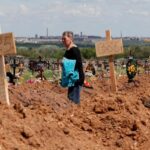
* First batch of official results roll in
* More of Hezbollah’s oldest allies lose seats
* Saudi-aligned Lebanese Forces gains ground
* Parliament more fragmented, clearing way for deadlock (Adds quotes, Hezbollah losses)
By Laila Bassam, Timour Azhari, Maya Gebeily and Tom Perry
BEIRUT, May 16 (Reuters) – Iran-backed Hezbollah and its allies are likely to lose their majority in Lebanon’s parliament following Sunday’s elections, three sources allied to the group said on Monday, in a major blow to the heavily armed faction that reflects anger with ruling parties.
Losses for the pro-Iran coalition – combined with unexpected wins for newcomer candidates against other establishment parties – could lead to political deadlock and exacerbate tensions, risking further delays to reforms addressing Lebanon’s crippling economic crisis.
Lebanon’s interior ministry on Monday announced a first batch of official results for the elections, the first since the economic meltdown and a huge port explosion rocked the capital.
Opponents of Shi’ite Muslim Hezbollah including the Saudi-aligned Lebanese Forces (LF), a Christian group, and reform-minded newcomers scored significant wins according to partial official results, campaign managers and party sources.
Political sources allied to Hezbollah said their own preliminary counts showed it was improbable the party and its allies would secure more than 64 of parliament’s 128 seats.
That marked a notable drop from the 2018 elections, when the alliance won 71 seats, pulling Lebanon deeper into the orbit of Shi’ite Muslim-led Iran and away from Sunni-led Saudi Arabia.
This year’s results could counter that influence. Iran on Monday said it respected the vote and had never intervened in Lebanon’s internal affairs.
Locally, the results leave parliament fractured into several camps and more sharply polarised between Hezbollah’s allies and opponents, who are not currently united into a single bloc.
“NATIONAL CELEBRATION”
Among the notable losses is top Hezbollah ally and deputy parliament speaker Elie Ferzli, 72, who lost the Christian Orthodox seat in West Beqaa, according to official results.
Ferzli lost to a candidate backed by established Druze leader Walid Jumblatt, but Jumblatt’s list also lost a Sunni seat to independent candidate Yassin Yassin. “After two-and-a-half years of directly facing off in the streets against a government of injustice, finally, we’ve begun the journey to change in Lebanon. This is a national celebration!” Yassin told Reuters.
Other startling losses include Hezbollah-allied Druze politician Talal Arslan, first elected in 1992, who lost his seat to newcomer Mark Daou.
Independent candidate Elias Jradi was expected to snatch an Orthodox Christian seat from Assaad Hardan, a pro-Syria member of parliament in Hezbollah’s traditional south Lebanon stronghold.
The LF said no single grouping had a majority – including Hezbollah – but put its own wins at 20 seats, up from 15 in 2018.
That would allow it to overtake the Hezbollah-allied Free Patriotic Movement (FPM), the biggest Christian party in parliament since 2005.
Founded by President Michel Aoun, the FPM won up to 16 seats, the head of its electoral machine told Reuters, down from 18 in 2018.
Their diminished representation – combined with losses in the south and West Beqaa – would deliver a “major blow” to Hezbollah’s claim of having cross-sectarian support for its powerful arsenal, said Mohanad Hage Ali of the Carnegie Middle East Center.
Nonetheless, Hezbollah and the allied Amal Movement of Parliament Speaker Nabih Berri swept all seats reserved for their Shi’ite Muslim sect, according to projections from both parties.
Sunni representation appeared split between allies and opponents of Hezbollah, amid low turnout for a sect once dominated by leading politician Saad al-Hariri, who lost Saudi backing in recent years.
Hariri’s withdrawal from political life splintered the Sunni political leadership and kept many would-be voters at home.
Impoverished Sunni-majority Tripoli scored the lowest voter turnout. Mustafa Alloush, a former Hariri associate who ran unsuccessfully as an independent there, said families waited for electoral bribes that never came.
“It’s such a sad scene,” Alloush told Reuters.
The next parliament must elect a speaker, nominate a prime minister to form a cabinet, then elect a president to replace Aoun, whose term ends on Oct. 31.
Any delay may further postpone reforms required to unlock support from the International Monetary Fund and donor nations.
Jamil al-Sayyed, an MP close to Hezbollah who retained his seat, told Reuters the result would lead to an increasingly dysfunctional political system.
Any failure to pull together a parliamentary majority raised the spectre of “social implosion or civil war, unless foreign powers intervene,” said Sayyed. (Reporting by Laila Bassam, Timour Azhari, Maya Gebeily and Tom Perry; Additional reporting by Lina Najem; Writing by Tom Perry and Maya Gebeily; Editing by Ed Osmond, Hugh Lawson and Frank Jack Daniel)




